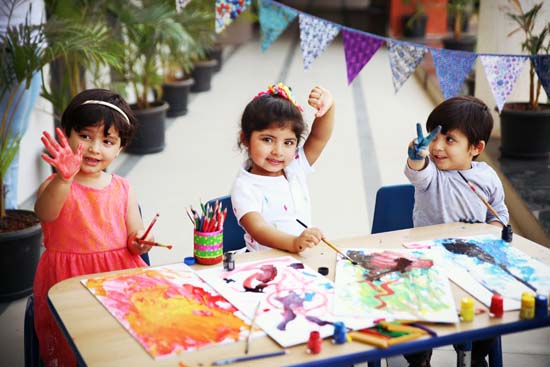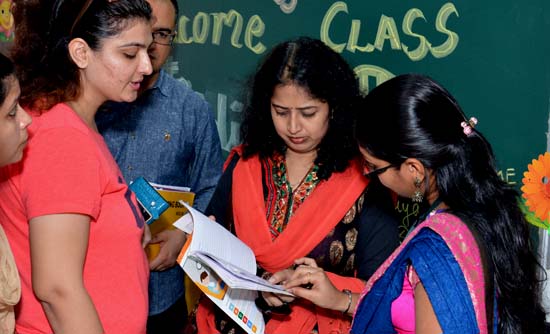skill development

We believe that we will not only turn out students who score well academically, but we will also tap the latent talent of each individual, seeking out methods to bring out the best in each child. Keeping this in mind, the school is set up to hone the individual strengths and interests of each child through Continuous Comprehensive Evaluation (CCE) and Co-scholastic assessment parameters.
WITH DPS PANVEL YOU CAN INCREASE
- Learning Skills
- Technical Skills
- Social Skills
- Creativity
interface friendly learning at DPS PANVEL
-
Curiosity: The system will encourage a questioning mind and a desire to experiment to find one’s own way, instead of going with the herd.
Individuality: A system in which the child’s feet are firmly and proudly rooted in his or her own culture, to ensure that he or she is capable of appreciating the best that can be assimilated from outside.
Value Systems: The school’s role will be critical in ensuring that students have a strong, uncompromised sense of right and wrong by developing a rewards system that reinforces this.
Social Responsibility: The school will instill in students a sense of responsibility to better the world in which they live. This includes sensitivity towards the differently abled and the less fortunate, along with the maturity to appreciate the rich social differences that make our truly pluralistic society. -
Reading: The school insists that students read avidly, as serious readers are more likely than those who do not read to get broader exposure to the world. The school library will actively circulate recommended reading lists that are contemporary, interesting and age-appropriate.
Writing: The focus of the school will go beyond the basics of grammar and spelling to ensure that every student learns how to best express oneself through the written word.
Math: A minimum level of competence in the science of numbers is critical for future studies in most disciplines. Hence, the school will encourage early appreciation and aptitude, so that students do not develop a mental block towards this important skill.
Simulation Laboratory: As a step forward in bringing best practices to the classroom, we will provide a laboratory to initiate and develop early learners into life skills. -
Sociability: In order to help students interact comfortably not only with their peers but also with elders, superiors and helpers, class teachers will closely observe the social dynamics of their students both inside and outside school.
Following Direction: Listening carefully and observing discipline are vital skills that will see students through in adult life as well. Therefore at DPS Panvel we also make sure that onus is equally on teachers to be clear, brief and audible when providing lessons.
Using Discrimination: The school counselor, together with the language teacher, will plan a teaching programme and strategy to teach students how to make informed choices.
Time Management: The school will ensure that students get sufficient time to pursue a skill-related activity along with their studies. It could be a sport, art, musical instrument, etc.
Positive Behaviour Management: A systematic counseling-based discipline system to inculcate self discipline in each student is practiced by all teachers at DPS Panvel. Rewards and behaviour cards are used instead of conventional punishment to modify behaviour and guide students. -
Motor skills: These typically develop in the early years. Towards this, our Pre-Primary School pays special attention to activities such as drawing, clay modeling, origami, paper cutting and tearing, and the planting and watering of seeds.
Navigation: Using the school floor plan to find one’s way around is a beginning at navigation, from where our students will learn to navigate the myriad situations life introduces them to.
Games and Sports: The school timetable will be carefully structured so that students get enough physical exercise. The school will also conduct regular medical check-ups and record personal data with a follow-up plan for parents.
Drama: This is a unique method of learning through simulating. Here students will develop self-confidence, verbal skills, voice modulation and stagecraft. -
Lab Time: To make understanding and learning of concepts hands-on, the school will have a timetable that insist on practicals so that scientific theory can be related to the physical world.
Computer: Computer skills are introduced as early as in the Primary School, so that, going forward, senior students can work on assignments leveraging their familiarity with the Internet and using up-to-date software.
Mapping: This skill will help develop a good sense of direction and interpretation of the environment that is an essential attribute in today’s world. -
Creativity: Clubs that encourage different interests and talents will be formed in the school. The grouping of students with similar interests into a club can provide the right motivation and boost to their interest and talent.
Inferencing: Nature treks and trails are a great way to understand the importance of the environment and truly be a part of it. To make this programme more meaningful, a scrap book and diary will be maintained by each student.
Model-making: This is a creative and useful method of harnessing special interests. It concretizes the learning process by making it more relevant and productive, and this will be achieved through Craft and Art.
Music and Dance: These are important avenues that enable students to not only de-stress and provide a sense of well-being, but also enhance their personalities and talents for self-expression. The school will make this possible through a well-structured syllabus where music and dance will form an integral part.
Speech and Drama: Developing these skills enhances a student’s creative talents and makes him or her more socially confident. The school curriculum has made this mandatory at least up to Class VII, with qualified professionals teaching these arts.


